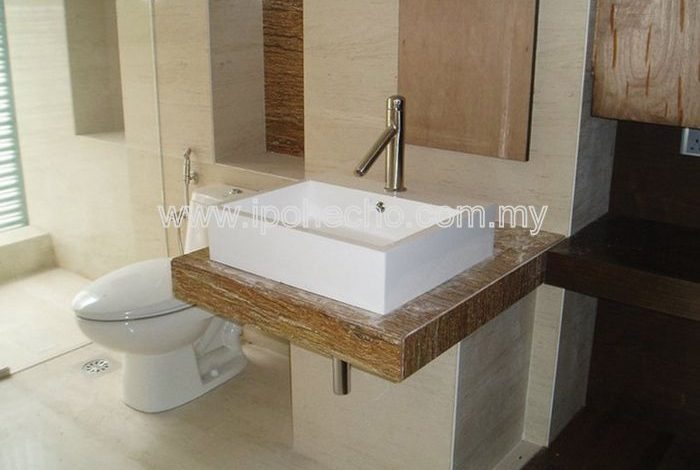

By A. Jeyaraj
The view along the North-South Expressway changes after one passes the Simpang Pulai junction. You see limestone hills on both sides of the road. Sadly, many of these natural outcrops have been stripped bare as a result of quarrying works.
There are opposing views on this activity. Some feel that there are compelling reasons why the hills should be preserved while others feel otherwise.
The state government, however, considers the limestone hills as a major source of income, as they are a much-sought-after commodity.
This cover piece attempts to explain the commercial viability of Kinta Valley limestone. This scribe met with people involved in the industry and drew his very own conclusions.


Limestone Quarries
Saw Lid Haw, Secretary of Quarry Association Perak admitted that quarrying is reputed to be a polluting industry but few know that limestone is an ingredient we use daily when we get up and when we retire to bed.


According to Saw, the industry experienced a downturn beginning in the year 2000. Presently, there are about 70 quarries operating around Simpang Pulai. Most of them process limestone and supply them to a number of factories within the state and abroad.
The local market, however, is small. They depend much on the export market, and India is the main export destination.
As for rehabilitation of quarries, Saw said that the government has introduced a scheme known as Lesen Melombong Tuan Punya (Owner-Mining Permit) whereby quarry operators pay a levy to the government and the money is then used for rehabilitation efforts. Saw added that since most of the quarries are still in operation, rehabilitation has yet to take place.
The industry survives largely because the quarries have been in operation for a long time. Equipment in use has been paid for. Capital expenditure is low while operating cost, due to prevailing circumstances, is going up.
Unlike the quarry operators, marble manufacturers do not have an association of their own.
Due to the downturn and stiff competition coming from Langkawi and abroad, only a few companies today produce marble furniture. Here are some of the more prominent ones:
Mutual Way Development and Construction Sdn Bhd


Items produced in his plant include calcium carbonate powder, asphaltic premix, quartz powder, feldspar and others. They also produce limestone aggregate for the building industry.
Sri Martek Marble Industries
Sri Martek Marble Industries is one of the early start-up companies. They have been in business for over three decades. Manager Chee Chiau Yen said they have their own quarry and use local marble for their furniture. Theirs is the only company whose main product is marble furniture.


The factory, located in Keramat Pulai, makes high-quality marble furniture, tiles and other limestone-based products. The furniture they make include dining and garden sets, imitation antique tables, TV cabinets, marble vases and others. They make block-matching slabs where four pieces of rectangular marble slabs are put together to form a unique design. These can be attached to the wall or placed on the floor with sizes varying between 4ft and 8ft. They are in the process of producing marble cabinets.
Sri Martek is pretty well known in the market. Walk-in customers come to buy their products daily. Their marketing company, SMT Stone Sdn Bhd, promotes and sells their finished products in shopping malls in Ipoh. They have showrooms in Klebang, Klang and Penang. Their export markets include Indonesia, India, Taiwan, Vietnam, the Middle East and Australia.
SR Marble Sdn Bhd
SR Marble Sdn Bhd is another early start-up company. Its factory is located in Mukim Sungai Raja. Tan Chuen Lim, Production and Sales Manager, said that previously they only used local marble, but now have resorted to imports due to scarcity. He makes kitchen tops made to order besides others. They make customised long baths. One of their hot-selling items is, interestingly enough, a marble chapati-making plate.
SR Marble has dealers in all the major towns in the country. Tan said that they do not export their products as local demand is more than sufficient.
Karmarstone Sdn Bhd
According to Tan Sau Leng, the company’s administrative executive. Karmarstone Sdn Bhd specialises in making tombstones. They also make unique garden sets, table tops, tiles and furniture.
They have a factory in China through which they export their products to various countries.
SE Supreme Marble & Granite Sdn Bhd.
The company has been in operation for about 35 years. Director Fan Kwai Fong said they produce table tops, dining tables, snooker tables and vanity tops. He added that their products are comparatively more expensive due to their high quality.
ES Marble Sdn Bhd
Peter S.K. Liang, Manager said that they specialise in marble flooring, bathroom walls and mosaic mural and many more. They have laid tiles in mosques, Chinese and Hindu temples and hotels.
Antico Stone Sdn Bhd
Vivienne Loh Wei Ping, Executive Director, said her company has been in business for over 30 years. Stones are crafted at their factory from the initial stages of cutting and fabricating to polishing and packing.
They produce floor and wall tiles and kitchen tops and install them. Their main business is in project works. When this scribe visited them they were laying tiles on the floor as a trial before sending to Penang for installation.

Cleanliness of Marble Furniture Factories
Most of the quarries are not only dusty but noisy too. The authorities have come down hard on them and have imposed strict safety procedures for adherence.
The factories this writer visited had clean floors and the surroundings were relatively tidy. The raw materials and finished products were neatly stored and with proper access. There was virtually no dust. The floors were dry except the areas where the blocks were sliced. Most of the jobs were done by machines and only a few people were working.
The relevant authorities visit the factories regularly to check for safety and cleanliness.


Manpower Shortage
There is a shortage of manpower, especially skilled workers. They need skilled people to install finished products in houses, hotels, restaurants and other places. Skilled workers have gone overseas for better pay. The state should emphasise on skills training and train workers for the marble industry.
Foreign labour is not cheap. Workers who have been in this country for some time and are experienced demand higher pay and benefits.
One-stop Shopping Area
Simpang Pulai is well known for its marble business and people go there to buy marble products. Since the factories are along one road, it is convenient for customers to visit various showrooms and shop around for what they want.
Just like pomelos and kacang putih, the marble industry is also unique to Ipoh where the factories are located in one area. Tourism Perak should designate this site as a tourist destination. Promotion and publicity are wholly lacking.


